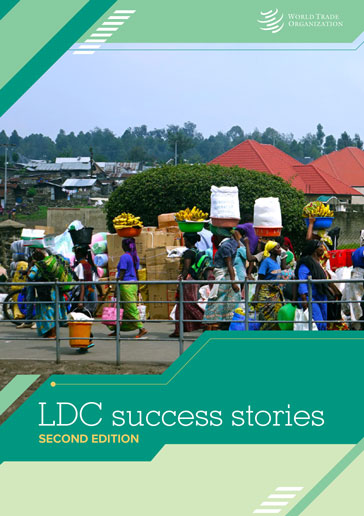Trade and development
Developing countries represent two-thirds of WTO members. Supporting their greater integration into global trade is a major priority for the WTO. WTO agreements have special provisions aimed at helping developing countries implement WTO rules while WTO technical assistance and other WTO-supported initiatives are aimed at increasing their capacity to trade.
See also:
Strengthening developing countries' capacity to trade
News
Trade and development
In the Committee on Trade and Development, WTO members discuss the linkages between trade and development, monitor the utilization of "special and differential treatment" provisions in WTO agreements and review notifications submitted by WTO members on preferential trade agreements with developing countries.
Trade and development negotiations focus on how to strengthen the existing special and differential treatment provisions of the WTO agreements.
The WTO also cooperates with the United Nations and other international organizations to advance the attainment of the Sustainable Development Goals.
Least-developed countries
Least-developed countries (LDCs) are the poorest members of the world. Among the 45 LDCs designated by the United Nations, 35 are WTO members while another seven LDCs are at different stages of negotiations to join the WTO (see list of acceding countries). Improving their participation in global trade is a shared objective of the international community.
LDCs benefit from preferential treatment at the WTO. WTO agreements include provisions specifically aimed at supporting LDCs. In addition, WTO members have taken a number of decisions to increase market access opportunities for LDCs, to help LDCs implement WTO rules and to support trade capacity building in these countries.
WTO members have offered duty-free market access opportunities to the LDCs. They have also taken steps to ensure that preferential rules of origin are simple and transparent so that LDC exports can benefit from market access opportunities. In addition, they have taken steps to provide opportunities for LDC exporters of services. LDCs also have longer transition periods to implement WTO rules, especially under the WTO Agreement on Trade-related Aspects of Intellectual Property Rights. The needs of LDCs have also been addressed at all WTO ministerial conferences.
The Sub-Committee on LDCs provides a platform for WTO members to explore opportunities for increasing LDC participation in global trade and to address the challenges they face. Some of the experiences shared by LDCs in the Sub-Committee are available in LDC success stories.
Graduation from LDC status
Graduation from LDC status represents an important milestone in the development path of LDCs. However, the phasing-out of international support measures associated with LDC status can present challenges for graduating LDCs as they seek to integrate more fully into the global economy.
Building trade capacity
Helping developing countries participate more fully in the global trading system is an important aim of the WTO.
The Aid for Trade initiative helps developing countries improve their capacity to take advantage of the opportunities offered by the multilateral trading system.
The WTO's trade-related technical assistance activities provide training to officials from developing countries to support trade capacity-building.
The WTO also supports the Enhanced Integrated Framework - the Aid for Trade programme for LDCs - and the Standards and Trade Development Facility.
MC13
Who are the developing countries in the WTO?
Definitions
Developing countries - overview
Least-developed countries
